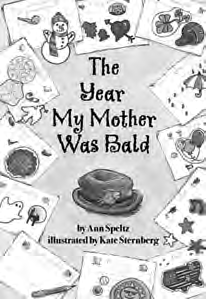100 Perks of Having Cancer: Plus 100 Health Tips for Surviving It (9 page)
Read 100 Perks of Having Cancer: Plus 100 Health Tips for Surviving It Online
Authors: Florence Strang
Tags: #Health; Fitness & Dieting, #Diseases & Physical Ailments, #Internal Medicine, #Oncology, #Cancer, #Medicine & Health Sciences, #Clinical, #Medical Books, #Alternative Medicine, #Medicine


Perk #5: Cancer Revealed to Me a Whole New Side of My Autistic Son
25
Ben may look like he is “in a world of his own,” but these gestures prove
to me that he is a sensitive boy who is very much aware of what is happening
in my world.
Not everyone is great with words. Just because
someone cannot tell you how they feel when
you are sick does not mean they don’t care.
HEALTH TIP #5
Choose Your Words Carefully When Telling
Your Kids About Your Cancer
I
magine this scenario: You bring your child to the doctor because you know
something is wrong, but the doctor makes you wait outside during the
exam. When she comes out of the room, she looks very concerned and whis-
pers something to the nurse. She brings your sick-looking child to you and
tells you everything’s fine, but she wants to see your child every two weeks
to treat him or her.
How would you feel? Angry? Confused? Worried?
Ready to demand answers?
Your child has these same feelings when you’ve told
them you are fine, but they see you going to doctor
appointments, getting weaker from chemo, losing your
hair, and squatting with your arms constantly wrapped
around the commode.
Your desire to protect your kids from your cancer
might cost you your relationship with them.
Experts in the field of child psychology agree that
with kids and illness, age-appropriate honesty is the best policy. Letting
them find out about your cancer from someone else, or trying to hide it,
can lead to:
26
100 Perks of Having Cancer
●
fear of losing you
●
worry that they caused the illness
●
fear that they can catch the cancer
●
worry that there is something a lot worse happening
●
learning that cancer is something you don’t discuss
●
feeling that they aren’t important enough to tell
●
mistrusting anything you tell them
●
a missed opportunity for your kids to support and help you through this
time
Once you have come to terms with your diagnosis and feel you can tell
your kids, find a time and a place where they feel comfortable, focused, and
will be able to express themselves freely. If you feel you need others around
you when you tell them, make sure your kids feel comfortable enough with
them that they can be themselves and express emotion
if needed.
Maintain a healthy
Start with just the basics of what you know and the
relationship with your kids.
plan of action. For example: “The doctor found a
Remember, your children
lump in my body, and I need to have surgery to take
are going through this
it out. I might need medicine to make sure the lump,
with you. Respect them
called a tumor, doesn’t grow back.”
enough to keep them
Then let your kids take control of the conversation,
in the loop.
asking questions if they want to, directing the conver-
sation. Don’t go into statistics, the unknown, or what
might
happen. And if you don’t know something, be honest. Either no one
knows, or you will find out the answer.
It is important that your children know that they can come to you at
any time with questions or concerns to get truthful answers. You may want
to arrange for others (family or close friends) who know about your illness
to be available to them as well.


Perk #5: Cancer Revealed to Me a Whole New Side of My Autistic Son
27
Some other things to remember:
●
Side effects of treatment may make it seem like you are getting sicker. Be
sure to explain this so it’s not misunderstood.
●
You might feel very comfortable at home with a bald head, but your
“chrome dome” might embarrass your thirteen-year-old. Respect the
feelings of your kids and have a hat handy for when your kids’ friends
come over.
●
Showing your kids your scars, bandages, and drains might be
too
much
honesty. You know your own children, but unless they ask to see this kind
of stuff, it’s best to keep it “under wraps.”
●
Kids can express worry in different ways: anger, being withdrawn, acting
out, or a sudden drop in school grades. If you are seeing any red flags,
use your pediatrician or the resources at your oncologist’s office (social
worker, support groups, and so forth) to look into the need for profes-
sional support.
●
Consider the ages of your kids. If there is a big age difference between
your kids, you may want to discuss this with them separately, but always
make sure you do it on the same day so no one feels like they were “the
last to know.”
There are wonderful books out there to help kids deal with
the issue of a parent having cancer.
When a Parent Has Cancer:
A Guide to Caring for Your Children
by Dr. Wendy Harpham,
who is a cancer survivor, a mom, and a doctor, is a great start.
Another book I can personally recommend is
The Year My
Mother Was Bald
by Ann Speltz. It is written as one girl’s journal
and follows her feelings as her mom goes through treatment,
and it has a great list of resources in the back. I think this book
would be great for boys or girls. My daughters were ten and
twelve when I was diagnosed, and they read this book until
the pages were ragged. Flash forward seven years, and I am cleaning out my
younger daughter’s room . . . and she still wants to hold on to that book.




Perk #6
Cancer Introduced My Teens
to All Major Household Appliances
M
y children are very fortunate in that they
grew up with the luxury of a maid wait-
ing on them hand and foot. For most of their
lives, they didn’t have to lift a finger to wash
dishes, prepare themselves a meal, or even
clean their rooms. The maid also doubled as
a chauffeur, driving them to their friends’
houses, parties, and other important social
engagements. If you have not guessed it by
now, the maid’s name is Mom (I should add
“slash” Ronnie, our babysitter).
You can just imagine my surprise when,
shortly after my first chemo, I walked into the
Kaitlyn and Donovan
kitchen to find Kaitlyn emptying the dish-
washer. I tried to hide my amazement and
carry on a conversation as if this was a normal part of our day. After all, I
did not want to scare her away! Just as I was making peace in my mind with
